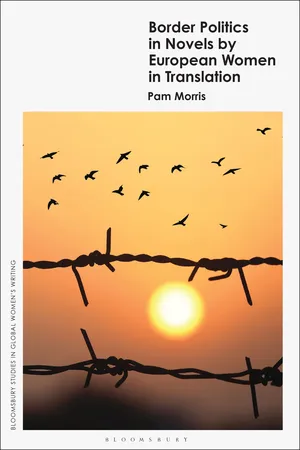
- 224 pages
- English
- ePUB (mobile friendly)
- Only available on web
Border Politics in Novels by European Women in Translation
About This Book
Is conflict inherent to the politics of borders? Recent global events, erupting from national, religious, class, racial and gender boundaries would suggest it is. From the inhumanity of post-Brexit British immigration policy to the violent suppression of women's freedom in Iran, to Russia's territorial invasion of Ukraine, and most immediately to the violent conflagration engulfing Palestine, border hostilities seem everywhere characterised by fearful and toxic intolerance of what is deemed other. This book examines the writing of award-winning European novelists to suggest an alternative perspective, one that redresses time-sanctioned hierarchies of mind over body, of ideals over physical reality. It explores novelistic representations of power, war, sacrifice, heroism, national history and identity, all issues more conventionally viewed within a male consensus. The fiction offers a cultural and imaginative response to border conflicts of all kinds, ethical, bodily, religious, and geographical, often drawing upon the writers' own personal experience of threatening divisions. Examining works by Virginia Woolf, Jenny Erpenbeck, Olga Tokarczuk, Herta Müller, Anna Burns, Chika Unigwe, Maylis de Kerangal, Magda Szabó, Elena Ferranti, Alki Zei, Elif Shafak, and Oksana Zabuzhko, it uses an integrated interdisciplinary approach to combine literary readings with detailed historical and political understanding of cultural context. Coming from many different cultures and histories, these writers speak a common condemnation of all hierarchies of worth and of exceptionalist identities whether sanctified by religion, nature, or tradition. Morris shows how their stories, read here in translation, also articulate a strikingly unified vision of a radical ecological understanding of human relations based on physical continuity and co-existence rather than borders dividing an idealised 'us' from a denigrated 'them'.
Frequently asked questions
Information
Table of contents
- Cover
- Half-Title Page
- Dedication
- Series Page
- Title Page
- Contents
- Acknowledgements
- Introduction
- 1 Gods of Sacrifice
- 2 Borders of Paranoia
- 3 Bodies Without Borders
- 4 The Doors of Class and Culture
- 5 Legends of Heroes, Legacies of Hate
- Ukraine: Not a Conclusion
- Bibliography
- Index
- Copyright